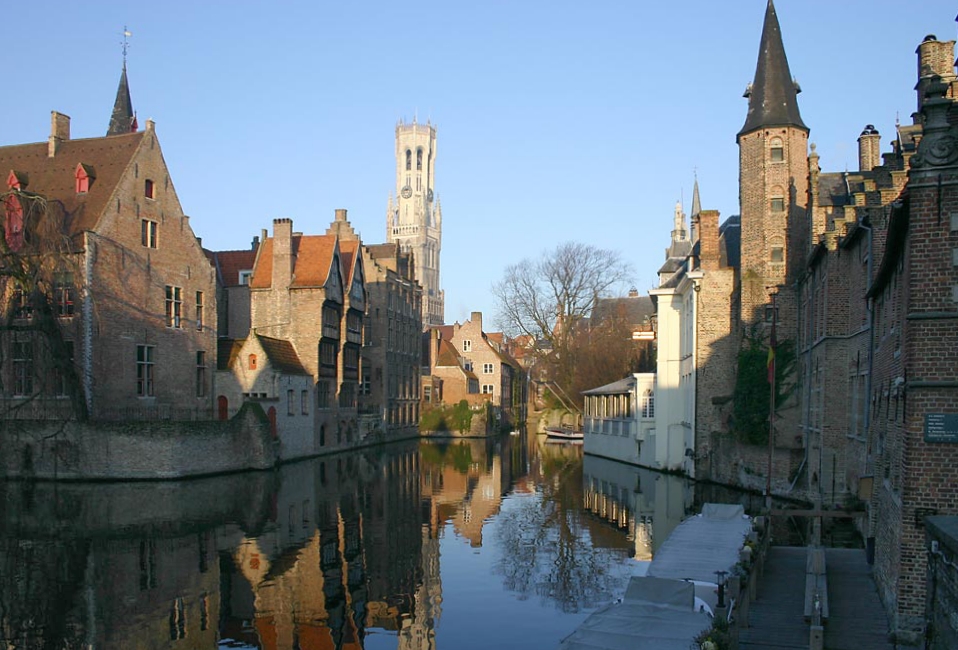Previously in War of The Flemings with Philip the Fair of France. And now Eyre Evans Crowe
Time: 1302
Place: Bruges, Flanders (modern Belgium)
 |
| Inside
CC BY-SA 3.0 image from Wikipedia.
|
Philip had been long involved in a controversy with Pope Boniface VIII, and the quarrel still continued. It was not till some time after the battle of Courtrai that the King at last, delivered from the menacing hostility of Rome, had leisure to turn his mind and efforts again toward Flanders. During the year 1303 he had sought to keep the Flemings at bay by bodies of Lombard and Tuscan infantry, whom his Florentine banker persuaded him to hire, and by Amadeus V, Duke of Savoy, who brought soldiers of that country to his aid. Although the long lances and more perfect armor of these troops gave them some advantage over the Flemings, the latter took and burned Therouanne, overran Artois, and laid siege to Tournai. Amadeus of Savoy, unable to overcome the Flemings by arms, recommended Philip to do so by treaty, and the King accordingly concluded a pacification, one condition of which was that the Count of Flanders should be released from prison to negotiate terms of fresh accommodation. The Flemings received the aged Count with respect; but he brought no terms which they were willing to accept; and he returned, as he had pledged his word, to captivity at Compiègne, where he soon after died.
For the campaign of the following year Philip, in lieu of Italian infantry, took sixteen Genoese galleys into his pay, commanded by Rainier de Grimaldi. This admiral passed through the Straits of Gibraltar and assailed the maritime towns and shipping of Flanders. Guy of Namur mustered to oppose them a fleet of greater numbers; but the Genoese, accustomed to naval warfare, defeated the Flemings and took Guy of Namur prisoner. Philip, at the same time, assembled a large army at Tournai, and marched to Mons-la-Puelle, near Lille, where the Flemings, to the number of seventy thousand, were encamped within a circumvallation of cars and chariots. There was no Robert of Artois on this occasion to precipitate a rash onslaught, and by Philip's order the southern light troops harassed the Flemings all day with arrows and missiles, allowing them no repose. Toward the evening many of the French withdrew to refresh themselves and take off their armor; the King himself was of this number; the Flemings, perceiving this slackness, and divining the cause, poured forth from their encampment in three divisions, which at first drove all before them, and reached as far as the King's tent, then in full preparation for supper. The monarch himself, without armor or helmet, was fortunately not recognized; his secretary, De Boville, and two Parisians of the name of Gentien, whom Philip had always about his person, were slain before his eyes. The King withdrew, but it was to arm, mount on horseback, and cry out to his followers to stand their ground. He himself, says Villani, "one of the strongest and best made men of his time," fought valiantly until his brother Charles and most of the barons, recovering from the first panic, came to his rescue, and the Flemings were finally repulsed and put to the rout. William of Juliers fell on the side of the Flemings; the son of the Duke of Burgundy and many others on that of the French. Philip immediately laid siege to Lille, deeming the Flemings totally discomfited. They had, however, rallied, obtained reënforcements at Bruges and at Ghent, and in three weeks appeared to the number of fifty thousand before the King's camp at Lille, crying for battle. Philip called a council, and observed that "even a victory would be dearly purchased over a party so desperate."
The Duke of Brabant and the Count of Savoy therefore undertook to negotiate with the Flemings, and Philip consented to grant them fair terms. He recognized their independent rights, agreed to liberate Robert, eldest son of Guido, Count of Flanders, as well as all those in captivity. He granted Robert and his son the fiefs which belonged to him in France, especially that of Nevers, and promised to give him investiture of the County of Flanders. The Flemings, on their side, consented to pay two hundred thousand livres, and to leave the King of France in possession of the three towns of Lille, Douai, and Béthune, that part of Flanders in which French was spoken. It was thus, at least, that the French interpreted the treaty, while the Flemings afterward alleged that French Flanders was merely a pledge for the payment of the money, not an alienation to the crown of France.
This ends our series of passages on War of The Flemings with Philip the Fair of France by Eyre Evans Crowe from his book History of France (5 volumes) last volume published in 1868. This blog features short and lengthy pieces on all aspects of our shared past. Here are selections from the great historians who may be forgotten (and whose work have fallen into public domain) as well as links to the most up-to-date developments in the field of history and of course, original material from yours truly, Jack Le Moine. – A little bit of everything historical is here.
More information here.
No comments:
Post a Comment